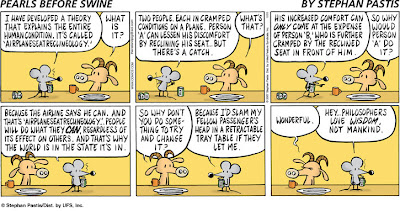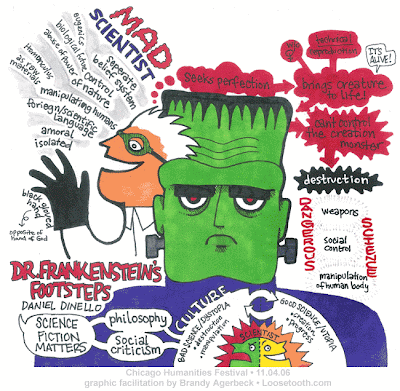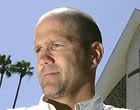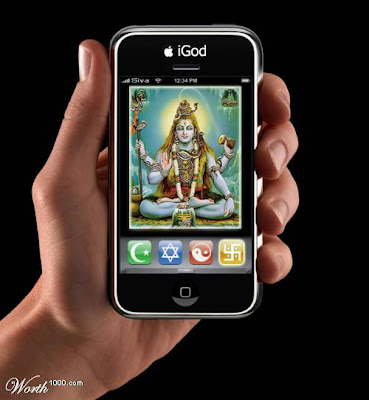

A wide open opportunity for thinkers on both sides of the God and no God debate to fully air their opinions in an environment where they can be fairly discussed. The goal will be to find new ways of contemplating the issue, and even come to agreement if we can find common ground.


Recently I listened to an interesting radio show, which added some substance to my views on people's religious experiences. I thought I should share this with you and get your impression. Randy, if you would like to publish the text below as a guest post on your God Vs No God blog, feel free.
New York's NPR station, WNYC, produces an excellent weekly show called "Radio Lab". The two hosts chat with each other, and with diverse experts (typically scientists and historians and doctors and psychologists, but sometimes people who just have unusual jobs or experiences), about interesting topics such as what time is, where the sense of self comes from, how memories are formed and recalled (or forgotten), how stress works, morality, mortality, etc. You can listen to it online and I strongly recommend it.
Anyways, they had one episode about the placebo effect. The show was introduced with the real-life story of a Native American who became skeptical of the healing powers claimed by the tribe's shaman. The young man simply could not believe that all that chanting and ritual had any effect on disease. So he "went undercover" and asked to become an apprentice shaman. As well as how to make certain remedies using plants and other substances, he learned many theatrical "tricks", such as putting some feathers in his mouth, biting the inside of his cheek to draw blood, then pretending to "suck" out the disease from the patient and then spitting out the bloody feathers. Knowing that the theatrics involved were just that, he started his shaman work, faking it just like the shaman who taught him. But, to his amazement, the "tricks" worked, even though sometimes he wasn't really doing anything (as far as giving them substances that might help them).
From there, the first half of the show is spent talking with scientists about how the placebo effect works. In case you're curious: Say you take a substance, be it aspirin or caffeine or ecstasy or an antidepressant, and it has some effect on you. The fact that it had an effect indicates that your cells have receptors for this substance (or for one very much like it), molecular "locks" that are triggered when a certain kind of "key" molecule snaps into them. But if your cell already has those receptors, then human cells have always had those receptors, and this means that your body can already manufacture that substance (or one very much like it). Somewhere in your body - maybe in one specific gland, maybe in every cell - you have the power to manufacture most of the kinds of "medicines" and "mind-altering substances" you need. The hard part is triggering that production. Mysteriously, thinking that you have ingested a substance that has a certain effect, can often somehow trigger the production of whatever substance the body can make which comes closest to having that effect, at least for a little while. Yes, this is an incomplete explanation but it contains some elegant and powerful insights I did not have until I heard it.
The second half of that show is what I really want to talk about. It talked about faith healers, and about a German guy in the 1700s named Mesmer (from whom we get the word "mesmerized") who claimed to "magnetize" things and to cure diseases using "animal magnetism", a ether-like substance that connects all living things. For example, he would rub magnetized iron rods against a tree, and claim that the tree now channeled "animal magnetism". His patients would then touch the tree, start shaking and moaning and convulsing and screaming... and after a while, many of them got better. But real doctors were losing patients to this, and scientists were understanding magnetism well enough at the time to know that this Mesmer was probably making this stuff up. So a commission of scientists (including Ben Franklin, the US's ambassador to France at the time) was formed, not to investigate whether Mesmer's magnetism worked (because, in many cases, it did) but to investigate whether it involved any real phenomenon external to the people treated by it, any kind of fluid or field that had real effects on the world. They performed a simple test: One of five trees was "magnetized" by Mesmer (or one of his followers, since he franchised this practice), and a patient being treated this way was asked to identify which of the 5 trees was "magnetized". As you may guess, few patients got it right. Still, the effects of mesmerism could not be denied, since a lot of people got better from what ailed them. The commission concluded that the effects of Mesmer's "Animal Magnetism" were not caused by any real ether-like fluid or field, but by the imaginations of the patients.
Many people today claim to have religious experiences, to see lights and speak in tongues, to be taken over by the Holy Spirit, etc. This is most noticeable in Pentecostals who are famous for this kind of stuff, and in Christian Scientists who claim that all disease is really just problems in one's relationship with God, but most Christians will claim to have perceived ( i.e. been affected by) the divine supernatural in some way. Listening to the story about mesmerism, about what it was like and the effects it had, made me think that these things can be easily explained as being induced by the person experiencing it, a kind of placebo effect, which makes sense since these people are the ones who believe that the Holy Spirit could actually come and make itself felt.
So, I ask: What is the difference between the Holy Spirit and Animal Magnetism?
Both have real observable effects. Neither can be shown to be triggered by anything outside the mind of the person experiencing it. I think that experiencing the divine is either a placebo effect, or the assigning of supernatural causes to phenomena that are naturally caused (like they used to with the weather, disease, etc).
Here is the MP3 of this show I am talking about. The part about mesmerism is from 42:35 to 50:20.
http://feeds.wnyc.org/~r/radiolab/~5/118525705/radiolab051807pod.mp3
And some more links for reference:
http://en.wikipedia.org/wiki/Mesmer#The_advent_of_animal_magnetism
http://en.wikipedia.org/wiki/Animal_magnetism







 to be fair and balanced here, so I report on the LA Times religion editor, who as a self-described "serious Christian," lost his faith while writing about religion in Southern California. He seems to have been most troubled by the Priest scandals and the excesses of the leadership at Trinity Broadcasting Network.
to be fair and balanced here, so I report on the LA Times religion editor, who as a self-described "serious Christian," lost his faith while writing about religion in Southern California. He seems to have been most troubled by the Priest scandals and the excesses of the leadership at Trinity Broadcasting Network.At the time, I never imagined Catholic leaders would engage in a widespread practice that protected alleged child molesters and belittled the victims. I latched onto the explanation that was least damaging to my belief in the Catholic Church — that this was an isolated case of a morally corrupt administration.
I understood that I was witnessing the failure of humans, not God. But in a way, that was the point. I didn't see these institutions drenched in God's spirit. Shouldn't religious organizations, if they were God-inspired and -driven, reflect higher standards than government, corporations and other groups in society?and regarding TBN
I tried unsuccessfully to get several prominent mainstream pastors who appeared on TBN to comment on the prosperity gospel, Hinn's "faith healing" or the Crouches' lifestyle. Like the Catholic bishops, I assumed, they didn't want to risk what they had. AS the stories piled up, I began to pray with renewed vigor, but it felt like I wasn't connecting to God. I started to feel silly even trying.You will recognize the major issues that William Lobdell struggled against
The questions that I thought I had come to peace with started to bubble up again. Why do bad things happen to good people? Why does God get credit for answered prayers but no blame for unanswered ones? Why do we believe in the miraculous healing power of God when he's never been able to regenerate a limb or heal a severed spinal chord?One can only suspect that there were many among his peers at the Times who were only too happy to encourage his steps away from faith. Without the balance of a Christian fellowship, scripture reading, or prayer, it was easy to slip away.
In one e-mail, I asked John, who had lost a daughter to cancer, why an atheist businessman prospers and the child of devout Christian parents dies. Why would a loving God make this impossible for us to understand?
My soul, for lack of a better term, had lost faith long ago — probably around the time I stopped going to church. My brain, which had been in denial, had finally caught up. Clearly, I saw now that belief in God, no matter how grounded, requires at some point a leap of faith. Either you have the gift of faith or you don't. It's not a choice. It can't be willed into existence. And there's no faking it if you're honest about the state of your soul.Many questions for both sides of the debate. Was he ever saved? Did his lack of centering in one doctrinal area get in the way of establishing a set of core beliefs (Catholic, presbyterian, TBN, Mormon?) Do we, as humans, need continuous indoctrination to maintain our core beliefs, whether Christian, Jew, Muslim, humanist, or atheist?
It may be possible to glimpse before the supposed beginning of time into the universe prior to the Big Bang, researchers now say.
Unfortunately, any such picture will always be fuzzy at best due to a kind of "cosmic forgetfulness."
The Big Bang is often thought as the start of everything, including time, making any questions about what happened during it or beforehand nonsensical. Recently scientists have instead suggested the Big Bang might have just been the explosive beginning of the current era of the universe, hinting at a mysterious past.
To see how far into history one might gaze, theoretical physicist Martin Bojowald at Pennsylvania State University ran calculations based on loop quantum gravity, one of a number of competing theories seeking to explain how the underlying structure of the universe works.
Past research suggested the Big Bang was preceded by infinite energies and space-time warping where existing scientific theories break down, making it impossible to peer beforehand. The new findings suggest that although the levels of energy and space-time warping before the Big Bang were both incredibly high, they were finite.
Scientists could spot clues in the present day of what the cosmos looked like previously. If evidence of the past persisted after the Big Bang, its influence could be spotted in astronomical observations and computational models, Bojowald explained.
However, Bojowald also figures some knowledge of the past was irrevocably lost. For instance, the sheer size of the present universe would suppress precise knowledge of how the universe changed in size before the Big Bang, he said.

Hitchens would have us believe that the first century church not only followed a man who never existed, but they constructed from the hearts of fishermen and tax collectors a collection of proverbs and stories that turned the world upside down. If so, then Jesus’ disciples are more clever in death than they were in life and the greatest miracle of all is that those common people not only corporately imagined Jesus’ life, but they went to their deaths by the tens of thousands for their collective dream; for a man who never lived. Hitchens’ contribution to history is his claim that the fire which consumed the Roman Empire was never struck…Your thoughts?
The featured article in this week’s eSkeptic is on the Soviet attempt to eradicate religion by fiat out of the Russian people. The attempt failed utterly. The historical experiment carries an important lesson for those who study belief systems in general and religion in particular: you cannot legislate beliefs and faith. Today’s atheists who are emboldened by Richard Dawkins’ Lennonesque clarion call to “imagine no religion” should read this article (and the book on which it is based) carefully, and then try to imagine another solution to the problems caused by religious extremists, for as another evolutionary biologist — Edward O. Wilson — cautioned us in his Pulitzer Prize-winning book, On Human Nature:
Skeptics continue to nourish the belief that science and learning will banish religion, which they consider to be no more than a tissue of illusions… Today, scientists and other scholars, organized into learned groups such as the American Humanist Society and Institute on Religion in an Age of Science, support little magazines distributed by subscription and organize campaigns to discredit Christian fundamentalism, astrology, and Immanuel Velikovsky. Their crisply logical salvos, endorsed by whole arrogances of Nobel Laureates, pass like steel-jacketed bullets through fog.
There is, indeed, something deeply elemental about the power of belief.
— Michael Shermer


From a distance, pleasure without fear or desire sounds pretty good. But in your grasp, it starts to feel less like paradise and more like soma. A species that shuts out adversity does not survive very long in a Darwinian universe. In the short term, humans with happy-making neural implants would cease to be interesting. Quenching feelings of hardship also means never feeling desire or want. Unpleasant as those emotions can be, they're also the basis for ambition and creativity. "Happy people are not ambitious," Greenfield says. "They do not build civilizations."One could argue that there is no inherent goodness in building civilization, and I have had some commenters on this and other blogs who feel all this need to grow and build is not the best for human kind. The Jesus People certainly would contend that the constant grasping for material improvement is not of God. Many environmentalists clearly would like to see a return to simpler times.
Maybe it's no coincidence that some of the happy-making stuff is manufactured in those countries. It's reminiscent of the scenario laid out by another prescient thinker, H. G. Wells. In his book The Time Machine, Wells wrote about a world where the happy, indolent elite — the Eloi — are served by industrious outsiders called Morlocks. The Eloi are also the hardworking Morlocks' food. Grim stuff. And also the exact opposite of what Jefferson was trying to tee up for Americans. Maybe he knew that if you have too much happiness, you don't get life and liberty.
A nationwide study released earlier this month found that 85% of 1,144 physicians surveyed believe that religion and spirituality have a positive influence on a patient's health.Once again, I don't propose that this proves there is a God, and the study appears to be pretty much type-of-god-neutral. And I wouldn't suggest to a non-believer: "Wanna be healthier and have more people show up when your in the hospital? Well, choose Jesus!" It is just one more thing. Maybe 1% of how the decision process might work, keeping believers in the fold. In most cases, it might not even be a conscious idea, merely an underlying understanding.
"They believe they will do better if God is on their side," said Robertson, chief heart surgeon at St. John's Health Center in Santa Monica.
The study, published in Archives of Internal Medicine, found that only 1% of the respondents said religion can have a negative effect on health. Two percent said that religion had no effect, and 12% said positive and negative effects were equal.
The study, which touched on a variety of subjects, also asked whether doctors believed that God or another supernatural being "ever intervenes in patients' health." Fifty-four percent said yes. Twenty-eight percent said no, and 18% were undecided.
Rejecting the usefulness or even coherency of the selfish gene concept, Gould and Lewontin have proposed that the adaptationist programme and sociobiology generates little more than untestable and unfalsifiable speculations about the origins of organismal adaptations, which after Rudyard Kipling’s tale of how the elephant got its trunk they have labelled Just So stories. If this charge where true, then sociobiology would indeed be the pseudo-scientific discipline its critics claim it is.
Obviously, atheists have certain axioms they like. Not all atheists like the same axioms, but they tend to be pretty similar axioms, when it comes to the purpose (if any) and nature of the universe and of the intelligent species in it. Christians also tend to like certain axioms. These axioms are not all the same (just think of the differences between the beliefs of a liberal Christian in the Northwest and a fundamentalist Christian in the South), but they do tend to include related axioms, and they do tend to not include many of the axioms shared by most atheists.
Here's where the fun starts: Many Christians seem to be convinced that their axioms are right, that their axioms are "truth". Similarly, many atheists seem to be convinced that the Christians' axioms are utter foolishness, and that any "reasonable, logical, educated" person would prefer the typical atheist axioms over the typical Christian axioms.
I believe that this approach leaves plenty of room for discrimination and prejudice and bigotry, but little room for empathy or real understanding. Besides, this approach is incorrect. It is incorrect because it seems to forget the fact (a fact that Christians AND atheists admit) that neither set of axioms is provable or testable. A reasonable person can look at the world we live in, study many things about it, and decide to be a Christian. The things we see in the world around us can fit into the conclusions one draws from the Christian axioms. Also, a reasonable person can look at the world we live in, study many things about it, and decide to be an atheist. The things we see in the world around us can fit into the conclusions one draws from the atheist axioms.
Both sides of the God vs nogod debate love to point out the "evidence" that supports their beliefs. This is BS, whether it's Behe doing it or Dawkins doing it. Sure, some things may seem hard to explain if you restrict yourself to a naturalist world view (such as the human mind, and the origins of many complex but effective biological structures and systems), and some things may seem hard to explain if you restrict yourself to a "The Bible is true" / "God loves us" point of view (such as all the injustice and unnecessary suffering in the world, the self-contradictory nature of Jesus, or the discrepancies between history (and natural history) as told in the Bible and as deduced from archaeological/scientific observations). But the fact is, all those things CAN be explained/rationalized into the axiomatic system of your choice. So yes, I strongly belief that the axioms you pick are a matter of personal preference. Neither set of axioms can be disproven. Both atheism and Christianity are self-consistent and can explain all the things we see in the world around us. It is impossible to prove that one set is "right" and the other is "wrong". These axioms are simply not testable. You choose whichever ones work for you.
Why do some people prefer the atheist axioms and other people prefer the Christian axioms? I don't know. You'd have to ask them. Many factors are probably involved, like upbringing, education (physics/math/engineering vs art/history/literature), maybe even genetics. But one thing is for sure: To some people, the atheist axioms seem more elegant, more satisfying, more believable, and make for a preferable world. And to some other people, the Christian axioms seem more elegant, more satisfying, more believable, and make for a preferable world. I really don't think there's a way to say that one of those groups is right and the other is wrong.
(Some atheists say that the preference for those foolish religious axioms is a byproduct of evolution, as are most things about the brain. On top of that, the persistence of these axioms over time is a result of the evolution and "aggressive marketing" of churches, of the memetic engineering that churches are so good at. Personally I think these atheists have excellent points. Still, I don't think that these points will make the religious axioms seem any less true to religious people, despite the optimism shown in the title of the most famous book about this topic ).
But fans of one set of axioms often point out that a conclusion or model derived from the opposite set of axioms fails to explain something about the world we observe. This brings me to the last point I want to make in this post. Remember that these axioms correspond to requirements. So different people have different requirements for what a satisfactory explanation of the universe must be. This means that a Christian "God did it"-style explanation will not satisfy an atheist – an atheist will claim that this is no explanation at all. And an atheist's "it just happened naturally via mechanisms described by math and physical law"-style explanation will not satisfy a Christian – a Christian will claim that this is no explanation at all.
For example, how did life come from non-life?
Governing Goals
Five Year Goals
Twenty Year Goals